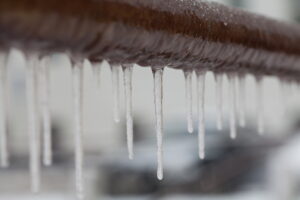 When the winter chill gets the coldest here in the Northeast—and we’re definitely at that point!—one of the biggest concerns that homeowners have is avoiding frozen pipes. When pipes freeze up, it stops the flow of water and it can severely damage the pipe, often leading to the dreaded burst pipe.
When the winter chill gets the coldest here in the Northeast—and we’re definitely at that point!—one of the biggest concerns that homeowners have is avoiding frozen pipes. When pipes freeze up, it stops the flow of water and it can severely damage the pipe, often leading to the dreaded burst pipe.
If you have frozen pipes in your house right now, the best step you can take is to call our expert plumbers. We have a long history in this region, so we know a thing or two about taking care of frozen pipes in Burlington, VT. Letting professionals handle your frozen pipes will solve the problem quickly and without the danger of pipe burst. (Bursting is most likely to occur when trying to unthaw the pipes because it increases the pressure within the pipe.)
But if you don’t have frozen pipes now, you definitely want to avoid them in the future. Here are our best frozen pipe prevention tips.
Don’t shut off the heat
Pipes often freeze up when people leave their homes for a few days or weeks for a vacation. They shut off the heater to save energy. This sounds wise, but turning off the heat is practically an invitation for pipes to freeze. The heat doesn’t need to be on at the normal temperature for when you’re home: instead, set the thermostat to keep the house at above 50°F while you’re gone. This doesn’t consume much energy and it will save you from the major expense of fixing frozen pipes.
Open sink cabinet doors and interior doors
The circulation of the warmer air inside the house around the pipes helps to stop them from freezing. When you leave the house for an extended period, open all the cabinet doors where there are pipes. Also, leave all the interior doors to rooms open to allow for even better warmer air circulation.
Insulate exposed pipes
Any place where you see exposed pipes are the pipes at a higher risk of freezing. You’ll find many of these pipes in the basement or attic. The best way to protect them is to give them extra insulation. You can purchase special insulation sleeves from stores that can be cut to length to fit these pipes. You can also ask our plumbers to provide pipe insulation.
Drip the faucets
Any movement of water inside the pipes will help stop them from freezing—it’s the pipes that are used the least often that have the highest chance of freezing. A way you can do this is to occasionally go around your house and allow each of the faucets to drip for a few minutes. This also relieves the pressure inside the pipe that can cause bursting. For faucets with both hot and cold water taps, turn both on, and for showers and sinks that use single handles, put the handle in the middle position for warm water; this way, both the hot and cold water lines receive protection.
Red Rock Mechanical, LLC serves Northwest Vermont and Northeast New York. Need pipes unfrozen? Just give us a call!







